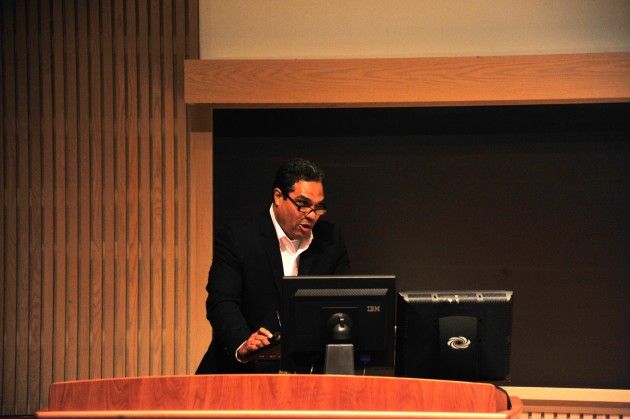Speaker Analyzes the Use of Comtemporary “Racial Grammar”
Last Thursday, author and Duke University Professor of Sociology Eduardo Bonilla-Silva came to campus to talk about “The Invisible Weight of Whiteness.” Despite the social advancements that have been made in the United States throughout the last two centuries, Bonilla-Silva argued that racism is still alive today, but in a different form than in the past.
Today, he claimed, racism persists in a much more implicit manner through what he called “racial grammar.” This grammar can influence how we think, interpret and behave towards those of a different race, particularly minorities. Often times, Bonilla-Silva claimed, we are blind to this racial grammar because it is something we have grown accustomed to in our everyday lives.
“Whites’ perceptions of blacks prevent them from seeing how things really are,” Bonilla-Silva said. While most Americans believe that violence and drug use are much more prominent among African-Americans, Bonilla-Silva cited some figures from the Center for Disease Control and Prevention that rebuke thesecommon misconceptions.
Accordint to Bonilla-Silva, when comparing white and black high schoolers, white high school students are seven times more likely to use heroin, ten times more likely to use crack and twice as likely to binge drink. Furthermore, violent acts are 11.5 times more likely in suburban schools than they are in predominantly black city schools.
“The facts don’t lie,” Bonilla-Silva said on Thursday, November 11.
Bonilla-Silva claimed that the greatest instrument of racism in America today is the media. From movies and TV shows to the five o’clock news, Bonilla-Silva said that the media constantly bolsters the “racial order of things.”
“There is an under-representation of minorities on TV and in movies. And when they do appear, they do so in a mostly stereotypical fashion,” Bonilla-Silva said.
Referring to the popular FOX TV series Glee, Silva noted that of the very few African-Americans that appear in the show, one is overweight. On the first season of Donald Trump’s The Apprentice, the lone black female contestant was the “pushy” and “hard to get along with” Omarosa. In the 2008 movie Hancock, the superhero played by Will Smith is only able to maintain his superpowers if he separates from his white wife, supporting the “power in segregation.”
Despite the prevalence of this racial grammar throughout the United States, Bonilla-Silva fears that it is being ignored.
“Privilege works so you don’t see that you have it,” Assistant Professor of Psychology Landon Reid said. “When you are not exposed to the problems of others, you don’t feel bad about their difficulties.”
In the past, Reid has had his students read one of Bonilla-Silva’s book titled Racism Without Racists: Color-Blind Racism and the Persistence of Racial Inequality in the United States. Professor Reid acknowledges that there are still great racial disparities in America today – even here at Colgate. Last year, Reid helped conduct the Colgate Campus Life Survey that focused on diversity amongst the student body. Although a number of students claimed that the reason for racial problems is due to racial minority self-segregation, it was found that most racial minorities actually had very diverse friendships.
“Before we begin to solve a problem we need to first acknowledge that there is an issue,” Reid said.
Colgate students present at Bonilla-Silva’s talk felt as though he made a valid point.
“I thought it was a great experience for an audience made of Colgate’s seemingly homogeneous student body to be exposed to a different point of view,” first-year James Speight said. “Whether or not you agreed with his views, the audience was still forced to confront his argument and analyze its base in our current society.”
Using phrases such as “whiteness” and “racial inequality,” Bonilla-Silva created a clout of tension in Love Auditorium last Thursday. These words are ones we are not used to hearing. However, Silva believes that the longer we ignore them, the longer we ignore the racial inequality that still exists in America.
To provoke change, Bonilla-Silva believes that there need to be more open conversations on racial inequality and therefore an end to turning a blind eye to its impact on American minorities. Like the many social movements of America’s past, Bonilla-Silva believes that it is through the nation’s struggles that justice will prevail.







